Related Research Articles

The Afroasiatic languages, also known as Hamito-Semitic, or Semito-Hamitic, and sometimes also as Afrasian, Erythraean or Lisramic, are a language family of about 300 languages that are spoken predominantly in the geographic subregions of Western Asia, North Africa, the Horn of Africa, and parts of the Sahara/Sahel. With the exception of its Semitic branch, all branches of the Afroasiatic family are exclusively native to the African continent.
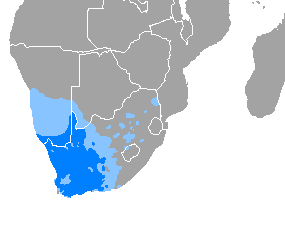
Afrikaans is a West Germanic language that evolved in the Dutch Cape Colony from the Dutch vernacular of Holland proper used by Dutch, French, and German settlers and their slaves. Afrikaans gradually began to develop distinguishing characteristics during the course of the 18th century. Now spoken in South Africa, Namibia and Botswana, Zambia, and Zimbabwe, estimates circa 2010 of the total number of Afrikaans speakers range between 15 and 23 million. Most linguists consider Afrikaans to be a partly creole language.

The Bantu languages are a language family of about 600 languages that are spoken by the Bantu peoples of Central, Southern, Eastern and Southeast Africa. They form the largest branch of the Southern Bantoid languages.

French is a Romance language of the Indo-European family. It descended from the Vulgar Latin of the Roman Empire, as did all Romance languages. French evolved from Gallo-Romance, the Latin spoken in Gaul, and more specifically in Northern Gaul. Its closest relatives are the other langues d'oïl—languages historically spoken in northern France and in southern Belgium, which French (Francien) largely supplanted. French was also influenced by native Celtic languages of Northern Roman Gaul like Gallia Belgica and by the (Germanic) Frankish language of the post-Roman Frankish invaders. Today, owing to France's past overseas expansion, there are numerous French-based creole languages, most notably Haitian Creole. A French-speaking person or nation may be referred to as Francophone in both English and French.

Niger–Congo is a hypothetical language family spoken over the majority of sub-Saharan Africa. It unites the Mande languages, the Atlantic-Congo languages, and possibly several smaller groups of languages that are difficult to classify. If valid, Niger-Congo would be the world's largest in terms of member languages, the third-largest in terms of speakers, and Africa's largest in terms of geographical area. It is generally considered to be the world's largest language family in terms of the number of distinct languages, just ahead of Austronesian, although this is complicated by the ambiguity about what constitutes a distinct language; the number of named Niger–Congo languages listed by Ethnologue is 1,540.

South African English is the set of English language dialects native to South Africans.

Swahili, also known by its local name Kiswahili, is the native language of the Swahili people, who are found primarily in Tanzania, Kenya and Mozambique. It is a Bantu language, though Swahili has borrowed a number of words from foreign languages, particularly Arabic and Persian, but also words from Portuguese, English and German. Around forty percent of Swahili vocabulary consists of Arabic loanwords, including the name of the language. The loanwords date from the era of contact between Arab slave traders and the Bantu inhabitants of the east coast of Africa, which was also the time period when Swahili emerged as a lingua franca in the region. The number of Swahili speakers, be they native or second-language speakers, is estimated to be around 80 million.
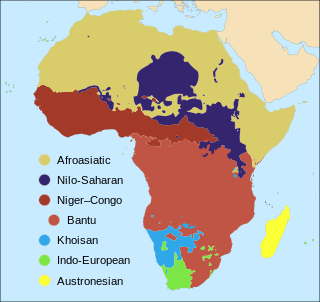
The languages of Africa are divided into several major language families:

Zulu, or isiZulu as an endonym, is a Southern Bantu language of the Nguni branch spoken in Southern Africa. It is the language of the Zulu people, with about 12 million native speakers, who primarily inhabit the province of KwaZulu-Natal of South Africa. Zulu is the most widely spoken home language in South Africa, and it is understood by over 50% of its population. It became one of South Africa's 11 official languages in 1994.
A lingua franca, also known as a bridge language, common language, trade language, auxiliary language, vehicular language, or link language, is a language systematically used to make communication possible between groups of people who do not share a native language or dialect, particularly when it is a third language that is distinct from both of the speakers' native languages.
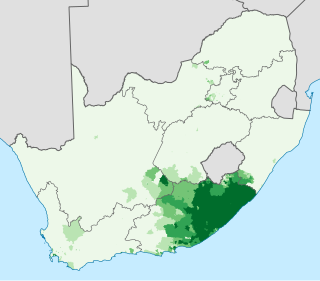
Xhosa also isiXhosa as an endonym, is a Nguni language and one of the official languages of South Africa and Zimbabwe. Xhosa is spoken as a first language by approximately 8.2 million people and by another 11 million as a second language in South Africa, mostly in Eastern Cape, Western Cape, Northern Cape and Gauteng. It has perhaps the heaviest functional load of click consonants in a Bantu language, with one count finding that 10% of basic vocabulary items contained a click.
Sotho or SesothoSouthern Sotho is a Southern Bantu language of the Sotho–Tswana ("S.30") group, spoken in Lesotho, where it is the national and official language; South Africa, where it is one of the 11 official languages; and in Zimbabwe where it is one of 16 official languages.
African-American Vernacular English, also referred to as Black (Vernacular) English, Black English Vernacular, or occasionally Ebonics, is the variety of English natively spoken, particularly in urban communities, by most working- and middle-class African Americans and some Black Canadians.

At least thirty-five languages indigenous to South Africa are spoken in the Republic, eleven of which are official languages of South Africa: Ndebele, Pedi, Sotho, Swati, Tsonga, Tswana, Venda, Xhosa, Zulu, Afrikaans, and English, which is the primary language used in parliamentary and state discourse, though all official languages are equal in legal status. Unofficial languages are protected under the Constitution of South Africa, though few are mentioned by any name. South African Sign Language has legal recognition but is not an official language, despite a campaign and parliamentary recommendation for it to be declared one.

Africa is the world's second-largest and second-most populous continent, after Asia in both cases. At about 30.3 million km2 including adjacent islands, it covers 6% of Earth's total surface area and 20% of its land area. With 1.4 billion people as of 2021, it accounts for about 18% of the world's human population. Africa's population is the youngest amongst all the continents; the median age in 2012 was 19.7, when the worldwide median age was 30.4. Despite a wide range of natural resources, Africa is the least wealthy continent per capita and second-least wealthy by total wealth, behind Oceania. Scholars have attributed this to different factors including geography, climate, tribalism, colonialism, the Cold War, neocolonialism, lack of democracy, and corruption. Despite this low concentration of wealth, recent economic expansion and the large and young population make Africa an important economic market in the broader global context.

The Arabic script is the writing system used for Arabic and several other languages of Asia and Africa. It is the second-most widely used writing system in the world by number of countries using it or a script directly derived from it, and the third-most by number of users.
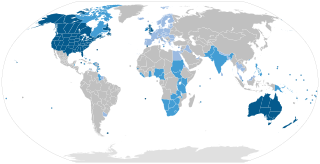
English is a West Germanic language in the Indo-European language family, with its earliest forms spoken by the inhabitants of early medieval England. It is named after the Angles, one of the ancient Germanic peoples that migrated to the island of Great Britain. Existing on a dialect continuum with Scots, and then most closely related to the Low German and Frisian languages, English is genealogically Germanic. However, its vocabulary also shows major influences from French and Latin, plus some grammar and a small amount of core vocabulary influenced by Old Norse. Speakers of English are called Anglophones.

South Africa, officially the Republic of South Africa (RSA), is the southernmost country in Africa. It is bounded to the south by 2,798 kilometres (1,739 mi) of coastline that stretch along the South Atlantic and Indian Oceans; to the north by the neighbouring countries of Namibia, Botswana, and Zimbabwe; and to the east and northeast by Mozambique and Eswatini. It also completely enclaves the country Lesotho. It is the southernmost country on the mainland of the Old World, and the second-most populous country located entirely south of the equator, after Tanzania. South Africa is a biodiversity hotspot, with unique biomes, plant and animal life. With over 60 million people, the country is the world's 24th-most populous nation and covers an area of 1,221,037 square kilometres. South Africa has three capital cities, with the executive, judicial and legislative branches of government based in Pretoria, Bloemfontein, and Cape Town respectively. The largest city is Johannesburg.
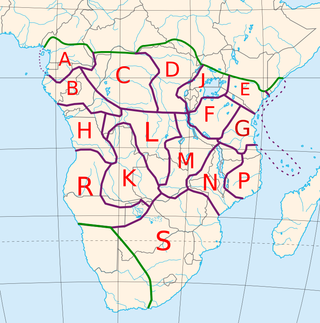
The Bantu peoples, or Bantu, are an ethnolinguistic grouping of approximately 400 distinct ethnic groups who speak Bantu languages. They are native to 24 countries spread over a vast area from Central Africa to Southeast Africa and into Southern Africa. There are several hundred Bantu languages. Depending on the definition of "language" or "dialect", it is estimated that there are between 440 and 680 distinct languages. The total number of speakers is in the hundreds of millions, ranging at roughly 350 million in the mid-2010s. About 60 million speakers (2015), divided into some 200 ethnic or tribal groups, are found in the Democratic Republic of the Congo alone.
References
- "Towards a new classification of African languages", Linguistic Contribution to the History of Sub-Saharan Africa, University of Lyons